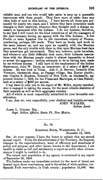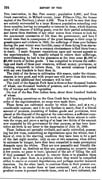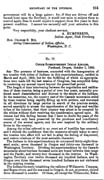
[p. 393]
Report of the Commissioner of Indian Affairs: No. 76
KIRKWOOD HOUSE, WASHINGTON, D. C., November 12, 1860.
SIR:At your request, I have the honor to submit this my second annual report. From the disturbed state of the Territory, the frequent changes in the superintendency, want of efficiency and steadiness of policy and purpose, and other causes known to the department, I am unable to make as full and satisfactory a report as under other circumstances I might be enabled to do.
The extent and population of my agency is contained in my report of September 30, 1859.
The Indians under my immediate control (or the most of them) are located upon three reservations, and in the midst of white settlers, viz: Spanish Fork reservation, in Utah county; population 15,000. San

[p. 394]
Pete reservation, in San Pete county; population 5,000; and Coon Creek reservation, in Millard county, (near Fillmore City, the former capital of the Territory,) about 4,000. Thus it will be seen that they are entirely surrounded by a large Mormon population extending over three counties, having no sympathy or interest in them, which deprives them of all chances of killing game, even for their partial subsistence, and leaves them destitute of any other source from whence to look for the commonest necessaries of life than the government; and here I would state that in consequence of the great damage to their crops by grasshoppers and crickets in 1859, the sufferings of these poor Indians during the past winter were horrible, many of them dying from starvation and exposure. It was a common circumstance to find them frozen to death. I made frequent requisitions upon and earnest appeals to the superintendent. He steadily refused to relieve their sufferings, notwithstanding he had in his possession at the time some $5,000 or $6,000 worth of Indian goods. I was compelled to witness the sufferings and death of these poor creatures, without money, provisions, or clothing wherewith to relieve them. On several occasions I parted with my own blankets to bury them in.
The yield of the farms in cultivation this season, under the circumstances, is very good, and with proper care will serve them this winter, and the only additional food necessary will be beef.
The yield of the Spanish Fork farm is three or four thousand bushels of wheat, one thousand bushels of potatoes, and a considerable quantity of turnips and other vegetables.
On that of the San Pete Indian farm, about three hundred bushels of wheat.
All farming operations on the Coon Creek farm being suspended by order of the superintendent, no crops were made there.
These farms are cultivated mostly by white labor, and at a very considerable expense; and I do not hesitate to assert, that if a liberal amount of presents, consisting of Indian goods and provisions, were placed at the disposal of the agent at the reservations, a sufficient number of Indians could be induced to work on the farms almost to cultivate the crops, and prove a saving of at least two thirds of the amount now expended by the government for that purpose, as has been heretofore set forth in my letter to the department of July 16, 1860.
These Indians are partially civilized, and easily controlled, possessing but few vices, committing, no depredations upon the whites, that I know of, even in the starving condition they have been in for a part of the last eight months; only on one or two occasions, when driven to extremes by hunger, have they been compelled to make peremptory demands upon the whites. They are now peaceable and friendly disposed toward us, destitute as they are, possessing no property except a few ponies, no game to hunt, ignorant of the art of tilling the soil if they possessed it, to attempt to remove them or to abandon them would be to place them in a position where they would be compelled either to starve or commit depredations, and perhaps murder innocent travelers. On the other hand, to continue them in their present condition will be to render them at least contented; and, if a wise and prudent course is pursued towards them, such as I have indicated, the

[p. 395]
government will be a large gainer; for, if they are driven off and turned loose upon the Territory, it would cost more to subject them to control again than it would require to support them five years in their present condition. I cannot too earnestly call your attention to this point.
Very respectfully, your obedient servant,
A. HUMPHREYS, Indian Agent, Utah Territory. Hon. CHARLES E. MIX, Acting Commissioner of Indian Affairs, Washington, D. C.